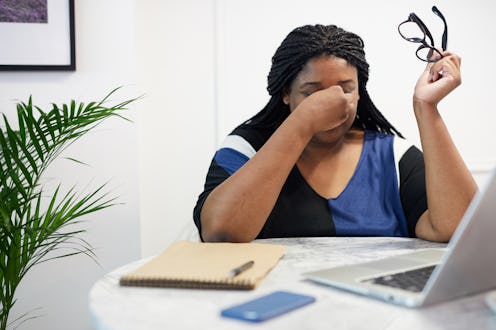Life
Your Body Deals With Stress Way Differently At Night Than In The Morning

Dealing with stress is a unique experience depending on the person and situation. According to new research, published in the journal Neuropsychopharmacology Reports, factors like the time of day may also play a role in stress management. The study found that the body may cope with stress differently in the evening than in the morning, meaning that dealing with stress you experience at night may be different to how stress affects you in the morning.
The two-part study, conducted at Japan's Hokkaido University, assessed a small sample of 27 subjects. Researchers measured their subjects’ regular sleep schedule over two weeks with wrist monitors, and saliva samples were also collected to determine salivary cortisol (aka, the stress hormone) levels throughout various waking hours. In the second experiment, the subjects were randomly assigned to two groups, performing a social stress test in either the morning or the evening and measuring subjects’ salivary cortisol levels and heart rate. The 15 minute stress test required participants to prep a presentation, which they then presented to three people and a camera. Because the flashbacks to middle school PowerPoint presentation days weren't anxiety-inducing enough, the subjects also had to do some mental math. The morning tests were conducted two hours post wake-up, while the evening tests began ten hours after subjects awoke.
The study results showed that the body's central nervous system reacted less strongly to stress in the evening than it did in the morning. Even though stressful events in the evening were found to release less of the body's stress hormones than those that occurred in the morning, there was no significant difference in the volunteers' heart rates (a sign that the sympathetic nervous system, which reacts to stress, was responding ) depending on time of day.
Basically, as The Cut explains, in the morning, our bodies have both the HPA axis response and our sympathetic nervous system to deal with stress, but in the evenings, there may be only a sympathetic nervous system response, according to this study’s findings. This suggests that environmental demands may play a role in the processing of stress, and there may be a possible vulnerability for people to stress in the evening.
If our bodies process night stress differently or potentially less effectively than in the morning, that may mean more coping mechanisms are necessary to deal with the onset of evening scaries. Mindful meditation is one practical method: in a 2017 pilot study, nurses, who notoriously work all around the clock and can experience high levels of stress throughout the day, who were trained in mindfulness meditation exhibited significantly reduced perceived stress after the stress-management intervention. Another tool, as Forbes reports, is to create a "buffer time" from when you leave work to when you go to bed to help diffuse stress. Avoid the urge to check your emails, if you can, and try squeezing in an activity in the time between work and sleep, like a dinner date with friends or a fitness class, to help calm your mind.
If you simply can't take your mind off of the stress, try specifically penciling in time to focus on your worrying itself. It sounds counterintuitive, but as neurologist Dr. Brandon Peters writes for VeryWell health, setting aside "scheduled worry time" in your evening to address your stressors can make them more manageable.
"Every day, take some time to identify, list, and work to resolve what causes you stress, anxiety, tension, or worry," explained Dr. Peters to VeryWell health. "This may be done by spending some time each afternoon creating or reviewing a list of the things that contribute to stress in your life. Write them down. Then, in a second column, provide a few action items that will allow the stress to be addressed and relieved."
If you find yourself chronically affected by stress and anxiety to the point where it's interfering with your life, consider reaching out to a medical professional. At the end of the day, experiencing too much stress, regardless of when, is never fun, and finding effective ways to manage and cope with your experience is a good idea.